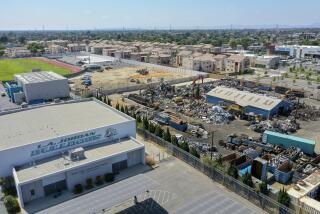Teledyne, Chilean Indicted in Sale of Bombs to Iraq
WASHINGTON — Los Angeles defense contractor Teledyne Industries and Chilean arms merchant Carlos Cardoen were indicted Wednesday on charges of violating U.S. arms export laws in the sale of 24,000 cluster bombs to Iraq before the Persian Gulf War.
Atty. Gen. Janet Reno personally approved the sweeping charges, despite evidence that U.S. agencies knew Cardoen was manufacturing the bombs for Iraq when Teledyne received export licenses from the U.S. government to sell him a key ingredient in the devices.
The indictment, which was returned by a federal grand jury in Miami, is the first U.S. criminal action against Western companies for arms sales to Iraq. The action sets the stage for a public airing of secret U.S. assistance to Iraq in the years leading up to the Gulf War and an examination of the United States’ larger prewar policy toward the regime of Saddam Hussein.
Last year, Democrats and other critics accused the George Bush Administration of covering up the extent of American military and economic prewar aid to Baghdad.
Defense lawyers for Teledyne and Cardoen signaled Wednesday that they will try to show that the U.S. government knew about Cardoen’s arms deals with Iraq and turned a blind eye to the transactions because of American support for Iraq in its war against Iran.
“Teledyne complied with the law regarding exports at every step and did not know Cardoen was using its product for military purposes,” said William Joseph Linklater, Teledyne’s defense lawyer. “Unlike the company, the government knew the precise use of the material but apparently chose to look the other way where shipments of weapons to Iraq were involved.”
Cardoen, who became one of Chile’s wealthiest men selling arms to Iraq, said in an interview earlier this year that he kept U.S. officials fully informed about his dealings with Baghdad, a position repeated by his attorneys on Wednesday.
Government documents described earlier by The Times show that the State Department and U.S. intelligence agencies knew by 1984 that Cardoen was making cluster bombs for Iraq. Some of the information came from a U.S. ambassador to Chile, who later went to work for Cardoen while an adviser to the CIA.
Despite the knowledge of Cardoen’s activities, the Commerce Department approved export licenses for Teledyne to sell Cardoen 130 tons of zirconium between 1983 and 1988. The indictment charged that Cardoen used the material to produce 24,000 cluster bombs worth $150 million for Iraq.
Cluster bombs were used widely by Iraq in its war against Iran. An aerial cluster bomb releases hundreds of smaller anti-armor and anti-personnel bombs over a wide area. Zirconium intensifies the burning of the bomblets and helps them penetrate armor.
The indictment charged that Teledyne and Cardoen engaged in a conspiracy to violate export laws from August, 1982, until October, 1989. The indictment also named a Teledyne sales manager, Edward A. Johnson, as well as four Cardoen employees and two of Cardoen’s corporate entities. Another Teledyne employee, Ronald W. Griffin, was charged with lying to federal investigators in the case.
The maximum penalty for violating the arms export law is 10 years in prison and a fine of $1 million. Other charges carry prison terms of five years and fines of up to $500,000 for the corporations.
Cardoen rejected a government attempt to enter into a plea bargain late last year. But sources close to the case said a former top aide to the Chilean businessman reached a deal with the prosecution to testify in exchange for leniency.
For Teledyne, the indictment is the second major blow from the government in as many months. In April, the Pentagon took the extraordinary step of banning one of the firm’s subsidiaries from receiving government contracts. It was the first time the Pentagon has imposed such a strong sanction against one of its 100 largest contractors.
Under the ban, Teledyne Relays was shut off from future contracts for a year. The action came after Teledyne pleaded guilty to improperly testing 9 million electronic components for a variety of weapons, from ships to missiles.
Teledyne’s lawyers had waged a desperate battle to avoid charges in the Cardoen case. The effort climaxed last Thursday when Linklater argued the company’s position in an unusual, 90-minute session with Reno, Deputy Atty. Gen.-designate Philip B. Heymann and other senior officials.
More to Read
Sign up for Essential California
The most important California stories and recommendations in your inbox every morning.
You may occasionally receive promotional content from the Los Angeles Times.










